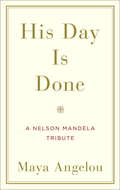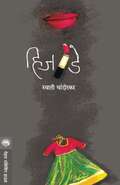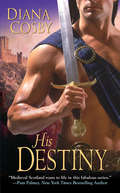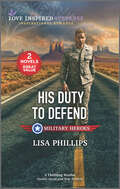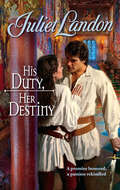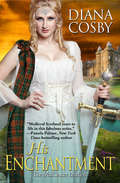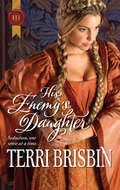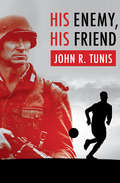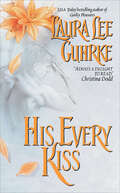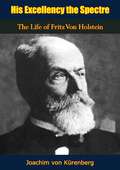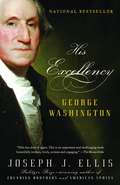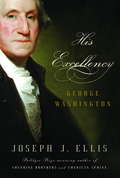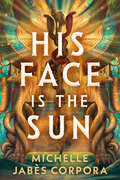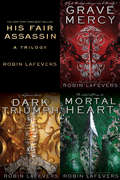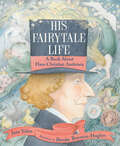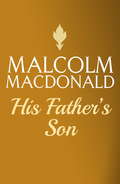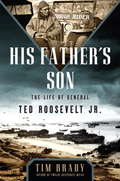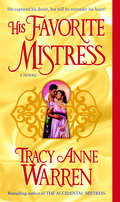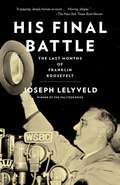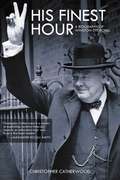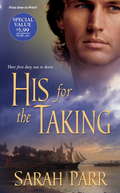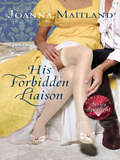- Table View
- List View
His Day Is Done: A Nelson Mandela Tribute
by Maya AngelouHe was a son of Africa who became father to a nation and, for billions of people around the world, a beacon of hope, courage, and perseverance in the face of opposition. Now, acclaimed poet Maya Angelou honors the life and remarkable soul of Nelson Mandela, former president of South Africa and Nobel laureate. In His Day is Done, Angelou delivers an authentically heartfelt and elegant tribute to Mandela, who stood as David to the mighty Goliath of Apartheid and who, after twenty-seven years of unjust imprisonment on the notorious Robben Island, emerged with &“His stupendous heart intact / His gargantuan will / Hale and hearty&” to lead his people into a new era. This poignant work of gratitude and remembrance offers condolences to the resilient people of South Africa on the loss of their beloved &“Madiba&” and celebrates a man like no other, whose life and work changed the world.Praise for His Day Is Done &“Moving and heartfelt.&”—The Washington Post &“A powerful, gripping tribute.&”—NewsOne &“[His Day Is Done captures] how many were feeling.&”—BBC News
His Day: हिज डे
by Swati Chandorkarसमाजातील उपेक्षित घटक असणारे तृतीय पंथीय अर्थात हिजडे यांची ही कहाणी. त्यांचेही निरनिराळे प्रकार असतात. कोणी जन्मत:च स्त्री किंवा पुरुषाऐवजी तृतीय पंथी किंवा हिजडा असतो. देहाची जाण/समज आल्यावर कोणी स्त्री आपण पुरुष व्हावे म्हणून तर कोणी पुरुष आपण स्त्री व्हावे म्हणून निसर्गाविरुद्ध जाऊन वाटेल तो त्रास, वेदना सोसायला तयार होतात. एखाद्या स्त्रीला स्त्रीदेहाचे तर एखाद्या पुरुषाला पुरुषदेहाचेच आकर्षण वाटते; अशांना लेस्बियन म्हणतात. दैनंदिन जीवनासाठी त्यांना भीक मागणे, शुभ प्रसंगी बधाईला जाणे किंवा शरीरविक्रय असे मार्ग पत्करावे लागतात. वेगळे जीवन वाट्याला आल्याने आणि समाजाकडून बहुधा तुच्छता तसेच हेटाळणीची वागणूक मिळाल्यामुळे हे सगळे एका छताखाली म्हणजेच एक वस्ती करून राहतात. यांनाही गुरू असतो/असते. सर्वांना आपली कमाई गुरुकडे जमा करावी लागते; त्या बदल्यात गुरू त्यांचे जेवण-खाण, कपडालत्ता, आजारपण यासाठी खर्च करतो/करते. अर्थात गुरू म्हणेल ती पूर्व दिशा! याच चाकोरीतून चेला पुढे गुरू होतो. यांचीही घराणी असतात आणि प्रत्येक घराण्याचा नायक असतो. हिजडा तरुण असताना जगण्यासाठी त्याला करावी लागणारी धडपड, तडजोड, वेदना यांना अंत नाही. आजार आणि म्हातारपण यांचा सामना करण्यासाठी मानसिक बळ मिळवणं हे मोठं आव्हान त्यांच्यासमोर आहे आणि तरीही हा तृतीय पंथ ताठ आहे. एकूण हे त्यांचं आयुष्य आहे, जे त्यांनी ‘असं आयुष्य हवं’ म्हणून न मागितलेलं आणि तरीही नशिबी आलेलं. त्यांनाही चांगलं आयुष्य हवं आहे आणि या चांगल्या आयुष्यासाठी त्यांचं एकच मागणं आहे – ‘आम्हाला माणूस म्हणून जगू द्या...’
His Destiny (MacGruder Brothers #4)
by Diana CosbyTheir secrets will draw them together, but the truth may tear them apart. &“Medieval Scotland roars to life in this fabulous series.&”—Pamela Palmer, New York Times-bestselling author As one of England&’s most capable mercenaries, Emma Astyn can charm an enemy and brandish a knife with unmatched finesse. Assigned to befriend Dubh Duer, an infamous Scottish rebel, she assumes the guise of innocent damsel Christina Moffat to intercept the writ he&’s carrying to a traitorous bishop. But as she gains the dark hero&’s confidence and realizes they share a tattered past, compassion—and passion—distract her from the task at hand . . . His legendary slaying of English knights has won him the name Dubh Duer, but Sir Patrik Cleary MacGruder is driven by duty and honor, not heroics. Rescuing Christina from the clutches of four such knights is a matter of obligation for the Scot. But there&’s something alluring about her fiery spirit, even if he has misgivings about her tragic history. Together, they&’ll endure a perilous journey of love and betrayal, and a harrowing fight for their lives . . .&“This was a great fun read. There was a lot of action. A lot of conflict. Some really hot love scenes. I loved how it all tied together, and the premise was unique.&” —History Undressed&“Diana Cosby immerses the reader in the harsh, yet beautiful, almost mystical environment of Scotland . . . His Destiny is a journey back in time that enchants with an awesome love story of two wounded hearts and souls that find redemption and love together. Good reading!&” —Long and Short Reviews
His Duty to Defend (Military Heroes)
by Lisa PhillipsHe&’s her best hopeDouble Agent When CIA agent Sabine Laduca investigates her brother's murder, she's forced into an uneasy alliance with his Delta Force team leader. Sergeant Major Doug Richardson hides his own secrets, but nothing will stop Sabine from finding out who killed her brother—even when the CIA declares her rogue. Now not only is the killer after her, so is the agency. And only Doug can help her find the truth…and keep her safe.Star Witness After years in witness protection, Mackenzie Winters fears her cover has been blown when someone shoots at her. Could the brother of the drug lord she put away be here for revenge? Mackenzie must rely on Delta Force soldier Aaron Hanning to protect her. Aaron doesn't want to be anyone's hero, but with danger stalking them, they'll both have to make a daring choice.2 Thrilling StoriesDouble Agent and Star Witness
His Duty, Her Destiny
by Juliet LandonLondon, 1473The time had come...duty called. Bound by his word, Sir Fergus Melrose would honor his betrothal, but first he must claim his betrothed....His task wouldn't be easy. Lady Nicola Coldyngham was no longer the young lass who had worshipped his every move. Nor, since he'd spurned her childish love, was she willing to give up her heart so easily again.Her defiance became his challenge-a challenge he was unable to resist. Spurred on by the promise of her fiery beauty, this was one contest Sir Fergus Melrose had every intention of winning.
His Enchantment (MacGruder Brothers #6)
by Diana Cosby"Medieval Scotland roars to life in this fabulous series." —Pamela Palmer, New York Times bestselling authorShe Could Never Live In His WorldLady Catarine MacLaren is a fairy princess, duty-bound to eschew the human world. But the line between the two realms is beginning to blur. English knights have launched an assault on the MacLarens, just as the families of Comyn have captured the Scottish king and queen. Now, Catarine is torn between loyalty to her people and helping the handsome, rust-haired Lord Trálin rescue the Scottish king. . . But He Couldn't Live Without HerAs guard to King Alexander, Lord Trálin MacGruder will stop at nothing to defend the Scottish crown against the Comyns. And he finds a sympathetic, and gorgeous, ally in the enigmatic Princess Catarine. As they plot to rescue the kidnapped king and queen, Trálin and Catarine will discover a love made all but impossible by her obligations to the Otherworld. But a passion this extraordinary may be worth the irreversible sacrifices it demands. . . Praise for the novels of Diana Cosby "Fans of Cosby will enjoy returning to William Wallace's historically detailed Scotland. Familiar characters play a large role, to the delight of longtime readers." —RT Book Reviews on His Destiny"Diana Cosby writes wonderful historical romance!" —Susan King"Passion, danger, lush history and a touch of magic." —Hannah Howell, New York Times bestselling author on His Conquest"Finally! A bold, lusty Medieval! Diana Cosby is superbly talented." —Cathy Maxwell, New York Times bestselling author on His Captive72,000 Words
His Enemy's Daughter (The\knights Of Brittany Ser. #1034)
by Terri BrisbinUSA Today–Bestselling Author: In eleventh-century England, a marriage born of vengeance may transform a scarred warrior’s angry heart . . .Once overwhelmingly irresistible to women, Soren Fitzrobert suffered a brutal wound at the Battle of Hastings that changed his life forever. Now Soren has come to wreak revenge by claiming his enemy’s daughter.Left temporarily blind by his invasion, innocent Sybilla trembles before the scarred barbarian. But it’s not entirely out of fear. . . .Forced into marriage, Sybilla must surrender to Soren’s seduction, one sense at a time. And Soren is drawn evermore to the woman he intended only to use. . . .“Brisbin continually delivers highly satisfying romances.” —Romance Reviews Today
His Enemy, His Friend
by John R. TunisWhen a German war-criminal-turned-soccer-star comes to play a match in post-war France, old wounds are reopenedConvicted in 1944 of war crimes committed in the occupied village of Nogent-Plage, former German Sergeant Hans von Kleinschrodt is sentenced to ten years&’ hard labor. By 1964, he has become the captain and goalie of the German champion soccer team—but he remains infamous throughout France, despite his insistence that he alone defied orders to slaughter the villagers when the Allied Forces arrived. When the German team must face the French champions in Rouen, the very city where Hans was sentenced twenty years earlier, the stage is set for a grudge match—and revenge.
His Every Kiss (The Guilty Series #2)
by Laura Lee GuhrkeAn infamous rake pursues the one woman who could change his ways in this “wonderful, lush, intelligently written” Victorian romance (All About Romance).Everyone knows about Dylan Moore—his brilliant talent and his shameless pleasure-seeking—but no one knows the torment that lies beneath his reckless veneer. Only one woman gets a glimpse of the forces that drive Dylan’s soul, a woman who haunts his dreams and evokes his passions as no other woman has.Disgraced and destitute, Grace Cheval wants nothing to do with the seductive man who desires her. When Dylan offers her a position as governess to his new-found daughter, she knows his true intentions are dishonorable. Yet she finds this charismatic man hard to resist, and she returns his passionate kisses with a fire that matches his own. Can Dylan dare hope that this proud, spirited beauty will melt the ice around his heart?
His Excellency the Spectre: The Life of Fritz Von Holstein
by Joachim Von Kürenberg E. O. LorimerThis book is a biography of Friedrich August Karl Ferdinand Julius von Holstein (1837-1909), a civil servant of the German Empire who served as the head of the political department of the German Foreign Office for more than thirty years, and who played a major role in shaping foreign policy after Bismarck was dismissed in 1890. It was first published in its English translation in 1933.“FOR close on forty years Baron Friedrich von Holstein exercised an immeasurable influence on Germany’s foreign policy, but to the German people he was completely unknown. He lived the life of a hermit. He went nowhere. He took no public part in anything. He had no use for outward ‘honours.’“Bismarck, Caprivi, Hohenlohe, Bülow, with one voice proclaimed him ‘indispensable,’ yet he remains a legend to our generation. His contemporaries admired him, hated, feared him. They nicknamed him ‘the Mole,’ ‘Hyena-Eyes,’ ‘His Excellency the Spectre.’ His policy may have been baleful, the means he used may not always have been fair according to our standards, yet no one can deny his great ability, his outstanding efficiency, his passionate love of country.“The Life of Fritz von Holstein is based on historic events or episodes which took place in the circles surrounding the recluse, so selected as to throw his unique personality into relief.”—Joachim von Kürenberg
His Excellency, George Washington
by Joseph J. EllisTo this landmark biography of our first president, Joseph J. Ellis brings the exacting scholarship, shrewd analysis, and lyric prose that have made him one of the premier historians of the Revolutionary era. Training his lens on a figure who sometimes seems as remote as his effigy on Mount Rushmore, Ellis assesses George Washington as a military and political leader and a man whose statue-like solidity concealed volcanic energies and emotions. Here is the impetuous young officer whose miraculous survival in combat half-convinced him that he could not be killed. Here is the free-spending landowner whose debts to English merchants instilled him with a prickly resentment of imperial power. We see the general who lost more battles than he won and the reluctant president who tried to float above the partisan feuding of his cabinet. His Excellency is a magnificent work, indispensable to an understanding not only of its subject but also of the nation he brought into being.
His Excellency: George Washington
by Joseph J. EllisNational BestsellerTo this landmark biography of our first president, Joseph J. Ellis brings the exacting scholarship, shrewd analysis, and lyric prose that have made him one of the premier historians of the Revolutionary era. Training his lens on a figure who sometimes seems as remote as his effigy on Mount Rushmore, Ellis assesses George Washington as a military and political leader and a man whose "statue-like solidity" concealed volcanic energies and emotions. Here is the impetuous young officer whose miraculous survival in combat half-convinced him that he could not be killed. Here is the free-spending landowner whose debts to English merchants instilled him with a prickly resentment of imperial power. We see the general who lost more battles than he won and the reluctant president who tried to float above the partisan feuding of his cabinet. His Excellency is a magnificent work, indispensable to an understanding not only of its subject but also of the nation he brought into being.From the Trade Paperback edition.
His Face is the Sun (Throne of Khetara #1)
by Michelle Jabès Corpora**INSTANT NEW YORK TIMES BESTSELLER**A new reign is coming...Romance, magic, adventure, and horror collide in the start to this lush, epic, Ancient Egyptian inspired trilogy perfect for fans of Leigh Bardugo, Tahereh Mafi, and Sabaa Tahir.Princess. Priestess. Rebel. Thief. Tensions run as hot as the Khamsin winds in the great kingdom of Khetara. Rumors of the pharaoh's mysterious illness abound, and with them, murmurs of rebellion grow. Meanwhile, in the quiet desert, a forgotten oracle begins to unfold, setting a dark prophecy into action and drawing together four strangers…Princess SITA lives in the abundance of the palace, and in a moment of passion, she unmasks a betrayal that will put her life—and the entire royal court—in grave danger.A priestess-in-training, NEFF strives to understand her intense visions from the gods, except theirs is not the only magic at play in the grand temple.As a farmer's daughter, RAE knows how much the pharaoh's men have taken from her land, her people. Still, who will step forward to confront the king?KARIM was raised among the pyramids of the Red Lands and survives on the wealth of the dead as a tomb robber. But amid the spoils, an ancient evil awakens…Bloodshed is coming. Only together do these four have the potential to save the kingdom from destruction. But when the dust has settled, who will sit on the throne of Khetara?
His Fair Assassin: A Trilogy (His Fair Assassin #3)
by Robin LaFeversIn fifteenth-century France, the convent of Saint Mortain provides sanctuary to girls seeking refuge from the cruelty of the outside world. But sanctuary comes at a price—and each of Death’s handmaidens pays it in blood. Grave Mercy is where the story begins, when seventeen-year-old Ismae escapes the brutality of an arranged marriage by joining the convent. An assignment brings her to the high court of Brittany, where she must navigate treason and temptation—especially when the master she serves demands the life of the man she loves. In Dark Triumph, after training as an elite killer to escape her past, Sybella must return to the home she thought she’d never see again. Her quest for justice against her violent family will bring nothing but destruction—until she meets a prisoner who gives her a reason to live. Annith yearns to serve Saint Mortain, but has spent her life watching her far more gifted sisters dole out Death’s vengeance from the safety of the convent. In Mortal Heart, her destiny is finally revealed, and it is the one she feared most: a life as a seeress, not an assassin. But Annith refuses to give up on her dream and decides that nothing will stand in the way of her ambitions . . . not even the convent itself. Together, these three novels make up the New York Times best-selling His Fair Assassin trilogy, where romance, magic, and political intrigue collide. Fans of Marie Lu’s The Young Elites and Kiersten White’s And I Darken will love this seductive dark fantasy collection.
His Fair Assassin: A Trilogy (His Fair Assassin #3)
by Robin LaFeversIn fifteenth-century France, the convent of Saint Mortain provides sanctuary to girls seeking refuge from the cruelty of the outside world. But sanctuary comes at a price—and each of Death’s handmaidens pays it in blood. Grave Mercy is where the story begins, when seventeen-year-old Ismae escapes the brutality of an arranged marriage by joining the convent. An assignment brings her to the high court of Brittany, where she must navigate treason and temptation—especially when the master she serves demands the life of the man she loves. In Dark Triumph, after training as an elite killer to escape her past, Sybella must return to the home she thought she’d never see again. Her quest for justice against her violent family will bring nothing but destruction—until she meets a prisoner who gives her a reason to live. Annith yearns to serve Saint Mortain, but has spent her life watching her far more gifted sisters dole out Death’s vengeance from the safety of the convent. In Mortal Heart, her destiny is finally revealed, and it is the one she feared most: a life as a seeress, not an assassin. But Annith refuses to give up on her dream and decides that nothing will stand in the way of her ambitions . . . not even the convent itself. Together, these three novels make up the New York Times best-selling His Fair Assassin trilogy, where romance, magic, and political intrigue collide. Fans of Marie Lu’s The Young Elites and Kiersten White’s And I Darken will love this seductive dark fantasy collection.
His Fairytale Life: A Book About Hans Christian Andersen
by Jane YolenThe storyteller becomes the story in this illuminating biographical picture book of Hans Christian Andersen, father of the modern fairy tale.A century and a half have passed since Hans Christan Andersen&’s death, but his stories are more alive than ever. Across languages, borders, and disciplines, his timeless creations have left a footprint beyond measuring. Now, come along back to the beginning and meet the human that came before the legend. He was a boy who lived with a mother who could not read, but remembered every fairy tale she&’d been told…Appropriately penned by Jane Yolen, who Newsweek has called &“the Hans Christian Andersen of America,&” His Fairytale Life is as immersive and transporting as all good fairy tales should be. Each page sings with Brooke Boynton-Hughes&’s dazzlingly intricate illustrations. Classics lovers and Disney fanatics alike will cherish this dreamy tome.
His Father's Son
by Malcolm MacdonaldOn a winter's morning in 1915, a baby boy is quietly brought down to a Cotswold gamekeeper's cottage. Fitzie is the love child of Miriam Lessore, the wayward daughter of the manor house. The father is rumoured to be the Prince of Wales - although one man knows different. Brought up as their own by Patrick and Martha Davy, the gamekeeper and his wife, the scandalous truth will never be known. Until Patrick returns from the war, his obedience to the old order gone, and ambitious now to become wealthy and independent. Until Martha joins Miriam in a business venture. Then, as the traditional divisions between squire and servant change, the pressures for the truth to be revealed become even more unbearable...
His Father's Son: The Life of General Ted Roosevelt, Jr.
by Tim BradyThe story of Theodore Roosevelt, Jr., a fortunate son who proved himself on the battlefields of two world wars.General Omar Bradley said of him, “I have never known a braver man or a more devoted soldier.” But for much of his life, Theodore Roosevelt’s son Ted seemed born to live in his father’s shadow. With the same wide smile, winning charm, and vigorous demeanor, Ted possessed limitless potential, with even the White House within his reach. In the First World War, Ted braved gunfire and gas attacks in France to lead his unit into battle. Yet even after returning home a hero, he was unable to meet the expectations of a public that wanted a man just like his father. A diplomat, writer, and man of great adventure, Ted remained frustrated by his lack of success in the world of politics, witnessing instead the rise of his cousin, Franklin, to the office that had once seemed his for the taking.Then, with World War II looming, Ted reenlisted. In his mid-fifties with a gimpy leg and a heart condition, he was well past his prime, but his insistence to be in the thick of combat proved a vital asset. Paired with the irascible Terry de la Mesa Allen Sr., Ted soon distinguished himself as a front-line general in a campaign that often brought him into conflict with another hard fighter, George Patton. On D-Day, Ted became the oldest soldier and the only general in the Allied forces to storm the beach in the first wave, hobbling across the sand with his cane in one hand and a pistol in the other. His valor and leadership on Utah Beach became the stuff of legends—and earned him the Medal of Honor.His Father's Son delves into the life of a man as courageous, colorful, and unwavering as any of the Roosevelt clan, and offers up a definitive portrait of one of America’s greatest military heroes.INCLUDES PHOTOSFrom the Hardcover edition.
His Favorite Mistress
by Tracy Anne WarrenMore romantic mischief among the gentlemen and ladies of Regency England is in store in the concluding novel of Warrens sprightly new trilogy. Original.
His Final Battle: The Last Months of Franklin Roosevelt
by Joseph Lelyveld"By far the most enigmatic leading figure" of World War II. That's how the British military historian John Keegan described Franklin D. Roosevelt, who frequently left his contemporaries guessing, never more so than at the end of his life. Here, in a hugely insightful account, a prizewinning author and journalist untangles the narrative threads of Roosevelt's final months, showing how he juggled the strategic, political, and personal choices he faced as the war, his presidency, and his life raced in tandem to their climax. The story has been told piecemeal but never like this, with a close focus on Roosevelt himself and his hopes for a stable international order after the war, and how these led him into a prolonged courtship of Joseph Stalin, the Soviet dictator, involving secret, arduous journeys to Tehran and the Crimea. In between, as the war entered its final phase, came the thunderbolt of a dire medical diagnosis, raising urgent questions about the ability of the longest-serving president to stand for a fourth term at a time when he had little choice. Neither his family nor top figures in his administration were informed of his diagnosis, let alone the public or his closest ally, Winston Churchill. With D-Day looming, Roosevelt took a month off on a plantation in the south where he was examined daily by a navy cardiologist, then waited two more months before finally announcing, on the eve of his party's convention, that he'd be a candidate. A political grand master still, he manipulated the selection of a new running mate, with an eye to a possible succession, displaying some of his old vigor and wit in a winning campaign. With precision and compassion, Joseph Lelyveld examines the choices Roosevelt faced, shining new light on his state of mind, preoccupations, and motives, both as leader of the wartime alliance and in his personal life. Confronting his own mortality, Roosevelt operated in the belief that he had a duty to see the war through to the end, telling himself he could always resign if he found he couldn't carry on. Lelyveld delivers an incisive portrait of this deliberately inscrutable man, a consummate leader to the very last. From the Hardcover edition.
His Final Battle: The Last Months of Franklin Roosevelt
by Joseph LelyveldA New York Times 2016 Notable Book"By far the most enigmatic leading figure" of World War II. That's how the British military historian John Keegan described Franklin D. Roosevelt, who frequently left his contemporaries guessing, never more so than at the end of his life. Here, in a hugely insightful account, a prizewinning author and journalist untangles the narrative threads of Roosevelt's final months, showing how he juggled the strategic, political, and personal choices he faced as the war, his presidency, and his life raced in tandem to their climax. The story has been told piecemeal but never like this, with a close focus on Roosevelt himself and his hopes for a stable international order after the war, and how these led him into a prolonged courtship of Joseph Stalin, the Soviet dictator, involving secret, arduous journeys to Tehran and the Crimea. In between, as the war entered its final phase, came the thunderbolt of a dire medical diagnosis, raising urgent questions about the ability of the longest-serving president to stand for a fourth term at a time when he had little choice. Neither his family nor top figures in his administration were informed of his diagnosis, let alone the public or his closest ally, Winston Churchill. With D-Day looming, Roosevelt took a month off on a plantation in the south where he was examined daily by a navy cardiologist, then waited two more months before finally announcing, on the eve of his party's convention, that he'd be a candidate. A political grand master still, he manipulated the selection of a new running mate, with an eye to a possible succession, displaying some of his old vigor and wit in a winning campaign. With precision and compassion, Joseph Lelyveld examines the choices Roosevelt faced, shining new light on his state of mind, preoccupations, and motives, both as leader of the wartime alliance and in his personal life. Confronting his own mortality, Roosevelt operated in the belief that he had a duty to see the war through to the end, telling himself he could always resign if he found he couldn't carry on. Lelyveld delivers an incisive portrait of this deliberately inscrutable man, a consummate leader to the very last.
His Final Battle: The Last Months of Franklin Roosevelt
by Joseph LelyveldA New York Times 2016 Notable Book“By far the most enigmatic leading figure” of World War II. That’s how the British military historian John Keegan described Franklin D. Roosevelt, who frequently left his contemporaries guessing, never more so than at the end of his life. Here, in a hugely insightful account, a prizewinning author and journalist untangles the narrative threads of Roosevelt’s final months, showing how he juggled the strategic, political, and personal choices he faced as the war, his presidency, and his life raced in tandem to their climax. The story has been told piecemeal but never like this, with a close focus on Roosevelt himself and his hopes for a stable international order after the war, and how these led him into a prolonged courtship of Joseph Stalin, the Soviet dictator, involving secret, arduous journeys to Tehran and the Crimea. In between, as the war entered its final phase, came the thunderbolt of a dire medical diagnosis, raising urgent questions about the ability of the longest-serving president to stand for a fourth term at a time when he had little choice. Neither his family nor top figures in his administration were informed of his diagnosis, let alone the public or his closest ally, Winston Churchill. With D-Day looming, Roosevelt took a month off on a plantation in the south where he was examined daily by a navy cardiologist, then waited two more months before finally announcing, on the eve of his party’s convention, that he’d be a candidate. A political grand master still, he manipulated the selection of a new running mate, with an eye to a possible succession, displaying some of his old vigor and wit in a winning campaign. With precision and compassion, Joseph Lelyveld examines the choices Roosevelt faced, shining new light on his state of mind, preoccupations, and motives, both as leader of the wartime alliance and in his personal life. Confronting his own mortality, Roosevelt operated in the belief that he had a duty to see the war through to the end, telling himself he could always resign if he found he couldn’t carry on. Lelyveld delivers an incisive portrait of this deliberately inscrutable man, a consummate leader to the very last.
His Finest Hour: A Biography of Winston Churchill (Brief History Ser.)
by Christopher CatherwoodWho was Winston Churchill? Even fifty years after his death, he is one of the most iconic figures in British history. As a young man he was a maverick journalist; his many positions in politics before 1940 marked him as a courageous but foolhardy man. Yet it is Churchill’s record in war, which has recently been questioned, that confirms his genius as a military commander and national leader—someone who understood the dangers of Nazi Germany before 1939 and someone uniquely capable to lead the empire through the turmoil of the Second World War. Christopher Catherwood argues that it was Churchill’s stand in 1940-41 that saved Britain and that only he was able to bring together the allies that eventually defeated Hitler in 1945. Catherwood has produced a challenging yet lively reassessment of the life and career of Winston Churchill, lion of British history and flawed hero.
His For The Taking
by Sarah ParrPersuasion Always Wins. . .On a mission to investigate treason, Privateer Marquis Warrick Barry believes he'll have no trouble getting the information he seeks from Karly Bane--the dark-haired beauty the Crown has ordered him to marry. But none of Warrick's tactics work. Unable to deny the hunger the fiery temptress elicits in him, Warrick realizes he must use seduction to persuade his new wife to trust him--both in and out of the bedroom. . .When Passion Is The Prize. . .As the daughter of a pirate, Karly knows she has nothing in common with the aristocratic Warrick--except an overwhelming mutual attraction. And though Warrick's intentions appear honorable, Karly cannot bring herself to reveal her closely guarded secrets. But when danger threatens to tear them apart, she must decide if she can share herself fully with the man who is now her husband--and if she wants a love that can last forever. . .
His Forbidden Liaison
by Joanna MaitlandLord Jack Aikenhead's notorious exploits have finally caught up with him, and now he must restore his reputation--by undertaking a covert intelligence operation in war-torn France. . . . Stepping in to protect silk weaver Marguerite Grolier against an attacker, however, throws his plans into disarray! Jack now needs the spirited French beauty's help on his mission and they must travel together--though she will be hopelessly compromised. But as she weaves her own alluring spell around him, marriage becomes an increasingly pleasurable prospect for this once-incorrigible rake!
